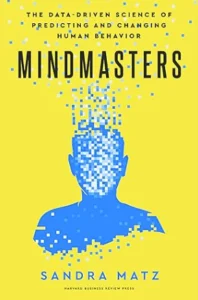Have you ever felt like your phone knows you a little too well? Maybe you were just thinking about a product, and suddenly, an ad for it appears in your feed. Or perhaps you searched for a book on psychology, and now your recommendations are filled with behavioral science content. This eerie precision isn’t a coincidence—it’s the result of artificial intelligence analyzing your digital footprint.
Sandra Matz’s Mindmasters: The Data-Driven Science of Predicting and Changing Human Behavior dives deep into this unsettling reality. As a professor at Columbia Business School, Matz unpacks the science behind psychological targeting—the use of big data and AI to predict, and even manipulate, human behavior. But her book isn’t just a warning; it’s also a roadmap to reclaiming control over your personal data.

The Power of Your Digital Footprint
Every click, like, and search query tells a story about you. AI systems track this data to build incredibly detailed psychological profiles. These algorithms don’t just understand what you buy—they can infer your personality traits, political beliefs, and even mental health status.
Take, for example, a 2013 study by researchers at Cambridge University, which found that Facebook likes alone could predict personality traits with remarkable accuracy. People who liked pages about meditation and art were more likely to be introverted, while those who engaged with sports pages often displayed extroverted tendencies. Advertisers, political campaigns, and even financial institutions use this type of data to craft highly personalized strategies—sometimes in ways that raise serious ethical concerns.
Manipulation or Empowerment? The Dual Nature of AI
AI’s ability to decode human psychology is a double-edged sword. On one hand, it can be used to improve lives—helping people make better financial decisions, encouraging healthier habits, and even supporting mental health initiatives. On the other, it can be weaponized to manipulate decisions, often without the individual’s knowledge.
Consider the infamous Cambridge Analytica scandal. The company harvested data from millions of Facebook users to create personality-driven political campaigns. By targeting people’s psychological vulnerabilities, it influenced voter behavior in ways that many felt were exploitative. Matz references cases like these to illustrate the risks of unchecked AI-driven influence.
But it’s not all dystopian. Matz also highlights examples where psychological targeting is used for good. One study she conducted showed that AI-powered messaging could help people save money by tailoring financial advice to their personality type. Those who were more impulsive responded better to messages emphasizing immediate rewards, while long-term planners preferred messages focusing on future security. This suggests that AI can be harnessed to encourage positive behaviors—if used ethically.
The Ethical Dilemma: Who Controls Your Data?
One of the most thought-provoking aspects of Mindmasters is its exploration of data ownership. Right now, corporations control most of the data collected from users. This power imbalance raises critical questions: Should individuals have more control over their data? Should companies be required to disclose how they use personal information?
Matz proposes a radical idea—data cooperatives. These would function like digital credit unions, where users collectively own and decide how their data is used. Instead of tech giants profiting from personal information, individuals could opt into data-sharing agreements on their own terms. While this concept is intriguing, its feasibility remains uncertain. Would major corporations willingly relinquish control? Could such a system be regulated effectively?
Are You Being Profiled? Signs and Real-World Examples
AI-driven profiling is so deeply embedded in daily life that you may not even notice it. But here are some common indicators:
- Your ads feel too relevant—like they know what you were thinking.
- News recommendations reinforce your existing opinions, nudging you into an echo chamber.
- Job offers or financial products seem tailored to aspects of your personality you never disclosed.
One alarming case Matz references is how insurance companies could use psychological data to assess risk. Someone who frequently searches for mental health resources might be flagged as a high-risk client. Banks, too, have explored using AI-driven personality assessments to decide loan approvals. If this becomes widespread, it could redefine financial and social opportunities—potentially in unfair ways.
How to Reclaim Your Digital Autonomy
The good news? You’re not powerless in this equation. Matz suggests several ways individuals can regain control over their digital presence:
- Limit unnecessary data sharing: Turn off ad personalization settings and minimize social media interactions that provide behavioral insights.
- Use privacy-focused tools: Switch to search engines like DuckDuckGo and use browser extensions that block trackers.
- Understand your data rights: Legislation like GDPR and the California Consumer Privacy Act gives individuals more control over their data. Exercise these rights when possible.
- Advocate for ethical AI: Support organizations pushing for transparency in AI decision-making.
While these steps won’t make you invisible to AI, they can reduce the amount of exploitable data available about you.
The Strengths and Shortcomings of Mindmasters
Matz presents a well-researched and engaging analysis of AI’s role in psychological targeting. She blends academic rigor with real-world examples, making complex concepts accessible. However, the book isn’t without its flaws.
One criticism is that some of her proposed solutions, like data cooperatives, feel more aspirational than practical. Implementing such systems would require massive regulatory shifts and cooperation from corporations unlikely to willingly give up their data dominance.
Additionally, while the book highlights key ethical concerns, some readers may feel it doesn’t go far enough in offering concrete policy solutions. Still, as a conversation starter, Mindmasters succeeds in raising awareness and pushing readers to think critically about the AI-driven world we now live in.
Final Thoughts: Is Mindmasters Worth Reading?
If you’ve ever questioned how much AI knows about you, Mindmasters is an eye-opening read. It bridges the gap between academic research and everyday concerns, making it a compelling book for anyone interested in psychology, technology, or digital ethics.
Matz doesn’t just diagnose the problem—she encourages readers to take action. While her vision of data cooperatives may be ambitious, her broader message is clear: AI-driven psychological profiling isn’t going away, but we still have a say in how it’s used.
So, the next time you see a strangely relevant ad, ask yourself: Who’s really in control here? And more importantly—what are you going to do about it?

